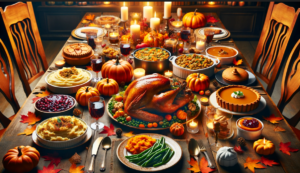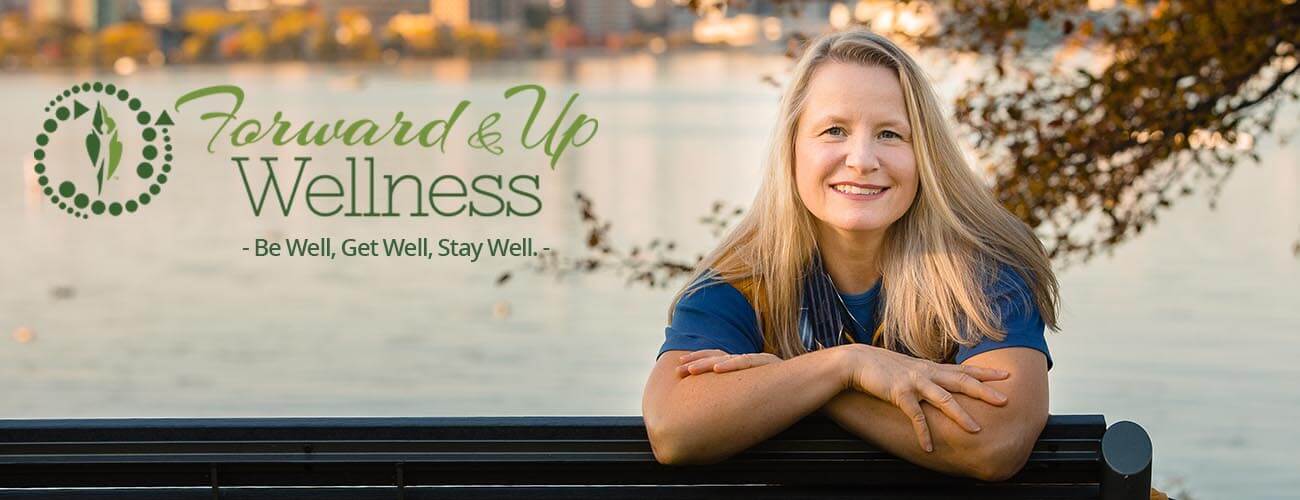Why am I so tired after the turkey feast? (Don’t blame the turkey!)
Gobble, gobble, it’s that time of year again! We’re in the throngs of holiday festivities and feasting, so let’s make this year a bit different if past years have proven less than satisfactory 😉
Whether you’re chowing down on turkey or something else, the common theme at this time of year is to overindulge… 
If a post-meal nap in front of a football game is a Turkey Day tradition for you, you’re not alone. But contrary to popular belief, it turns out it’s not all about the tryptophan-containing turkey. Below, dive into the science behind this frequent phenomenon and what you can do to feel more energized after a big meal on any day.
The Truth About Turkey & Tryptophan
Many people blame the main character of the traditional Thanksgiving meal — turkey — as the culprit behind the post-meal sleepiness. Turkey contains tryptophan, an essential amino acid linked to the production of neurotransmitters serotonin and melatonin, which can induce feelings of relaxation and sleepiness. While tryptophan might be part of the story, it’s not all the turkey’s fault.
The reason: A typical serving of turkey (around 8 ounces), contains only 125 to 150 mg of tryptophan — not nearly enough to cause you to fall asleep, which research suggests would be about 1000 mg. Myth debunked!
Plus, alongside tryptophan, turkey contains many other amino acids which compete for entry into your brain. The catch: For an amino acid to pass through the blood-brain barrier, it requires transport on a carrier protein. But due to competition from the many other amino acids, it’s harder for tryptophan to find a transport carrier. Thus, it’s unlikely to raise levels in your brain. Debunked again!
This leaves us with the obvious question…
Why Am I So Tired After Thanksgiving Dinner?
While tryptophan in turkey may contribute to a feeling of drowsiness, it’s more likely that you feel sluggish after a big meal due to a combination of factors, including the consumption of carbohydrates, alcohol, and the larger-than-typical volume of food. Dang…
1. The Carb-Induced “Food Coma” Is Real
Carbohydrates are plentiful at most Thanksgiving dinners — think: mashed potatoes, stuffing, sweet potato casserole, dinner rolls, and pecan pie.
When you consume a high-carbohydrate meal, it triggers the release of insulin to help process the glucose (aka sugar) in your bloodstream.
If your body has more sugar than usual, it can cause a rapid insulin spike to uptake glucose. The sudden spike and drop in blood sugar that happens after eating simple carbs can lead to an energy crash, also known as reactive hypoglycemia, causing you to feel tired.
This insulin surge also leads to a relative increase in tryptophan in your bloodstream, helping it enter the brain. In the brain, tryptophan eventually converts into serotonin and melatonin, both of which are neurotransmitters that increase feelings of relaxation and sleepiness.
In other words: Turkey alone won’t make you tired, because without the insulin surge, the tryptophan won’t effectively enter the brain. Even with the insulin, you’re probably not eating enough turkey to feel the effects of tryptophan. Rather, drowsiness after a meal is also linked to the plethora of simple cards on your plate as well.
2. Drinking Makes You Drowsy
Socializing with family and friends is often accompanied by a glass of wine in hand. Alcohol acts as a sedative, which means it affects your central nervous system and can cause drowsiness.
It can also impair the quality of your sleep later in the night, making you more tired the next day. I have an Oura ring that tracks all kinds of health factors including sleep, naps, and energy levels. Data from Oura members and found that the amount of naps taken the day after Thanksgiving increase by 7% – this might be why!
Combining alcohol with celebratory socializing — plus relaxation time on the couch — can further intensify your post-dinner drowsiness.
3. You’re Likely Eating More Than Normal
When you consume large amounts of food, your digestive system works in overdrive to process the meal. Your heart rate increases and your metabolism ramps up, which are both energy-intensive systems. This can divert blood flow away from other areas, including your brain, leading to fatigue.
Additionally, eating a big meal stimulates the parasympathetic nervous system. This is your “rest-and-digest” branch of the autonomic nervous system. As you may expect based on the name, this part of your nervous system promotes relaxation and drowsiness. Maybe that’s why they call it comfort food!
So what’s a person to do?
5 Tips to Prevent Thanksgiving Tiredness
If you have the ability to take a power nap post-Thanksgiving, go for it. (Just avoid taking a nap too close to bedtime to avoid interrupting your sleep!)
However, parents with young children or people hosting Thanksgiving may not have the luxury of taking a post-meal nap. If that sounds familiar, implement these 5 tips at your next feast to help prevent post-meal fatigue.
- Have an after-meal espresso, green tea or other lightly caffeinated beverage: A single espresso shot contains about 60 milligrams of caffeine — enough to perk you up, but for most people, usually not enough to impact your sleep. Plus, science suggests that post-meal caffeine may enhance digestion and relieve fullness. Green tea has many beneficial antioxidants so it may help curb a virus or bacteria if you’re in a large group. That being said, caffeine has a half-life of about five hours, so if you’re eating in the evening or at all sensitive to caffeine, skip it.
- Eat enough protein and healthy fat: Imagine dividing your plate into three sections, and fill each with protein, veggies, and carbs. Eating a meal that’s high in protein can help you avoid a postprandial dip in energy, as protein can help you avoid the glucose spike and crash. One study found that people who ate a meal with at least 35% protein had lower post-meal blood sugar. Another great way to minimize the crash is to eat a healthy fat along with your meal. Avocado, olives or olive oil, raw and unsalted nuts (esp. walnuts!) are all good examples of healthy fats that can be eaten during the feast. Healthy fats, like those found in avocados, nuts, and olive oil, can help curb appetite by triggering the release of satiety hormones (leptin) in the body, which signal to the brain that you are full, and by slowing down the emptying of the stomach, leading to a prolonged feeling of fullness; this is largely due to a fatty acid called oleic acid which is converted into a compound called OEA that sends signals to the brain to reduce hunger. More healthy fat in the meal and taking rests between bites, chewing properly can also stop you from overeating.
- Control your portions: I’m a HUGE proponent of the concept of abundance! When we go for some of these holiday meals, we are almost acting as if we have a famine approaching and that this meal is our last; fill ‘er up! If you really think about it, we will have leftovers (that we’ll eventually get tired of) and we are lucky enough to have MORE than enough food at any given time. So remember to fill your plate to a normal capacity and remind yourself that the leftovers will be the tomorrow, the day after that, and the day after that…
- Get some fresh air: Grab the family and go for a walk around the block after your feast. A study found that a 30-minute walk substantially reduces the glucose peak, improving your glycemic response. Plus, if there’s a little family tension in the room, this is a great way to reset your emotions which will also help you digest properly by reducing the negative feelings.
- Sip smartly: If you do want to consume alcohol, alternate a glass of water for every alcoholic beverage you consume. And that brings me to sipping at all; hold off on drinking ANYTHING while eating. It will dilute your digestive juices so that your stomach cannot digest the food properly, especially the harder to digest proteins.
- Focus on sleep the night before: Getting a solid night of shuteye the night before Thanksgiving helps balance your mood, improve your energy, and lower levels of ghrelin — the hunger hormone.
Bottom line, have fun this holiday season! Enjoy in the merriment and choose ONE thing to do differently this holiday meal and see how you feel; if you feel better and enjoy your merriemnt even more, then you know you’re on the right track.

2 Comments
PeggyCummings
Dear Anke,
I love what you write and I am so proud of what you are doing.
Love, Peggy
Anke
Thank you Peggy! I never thought much about being a writer, but I sure do love creating the content that I hear people chat about. There’s usually a hot beverage associated with the creation of each blog;) Love right back to you!